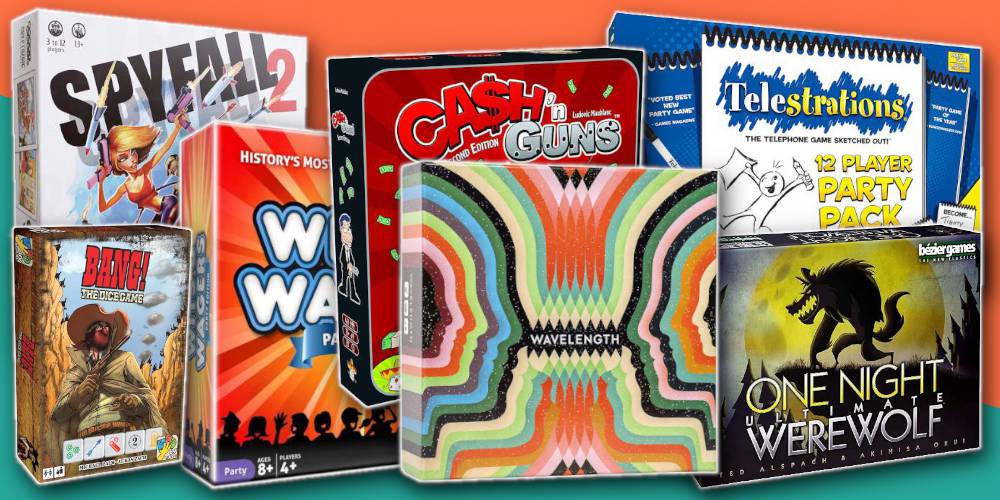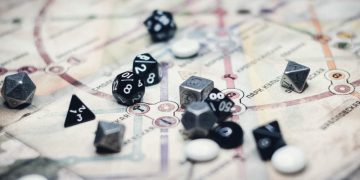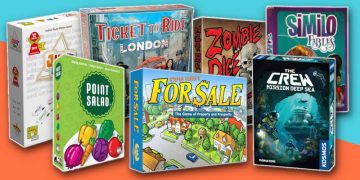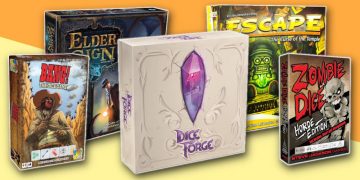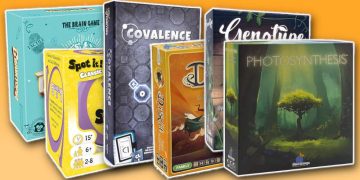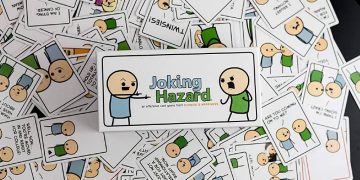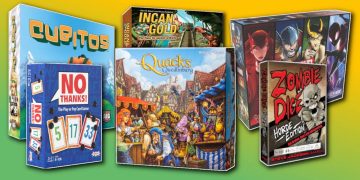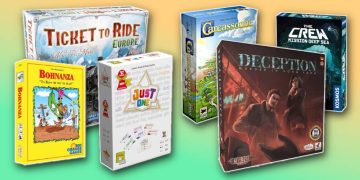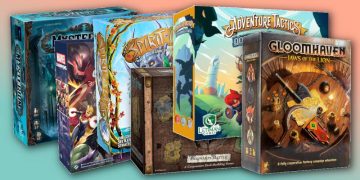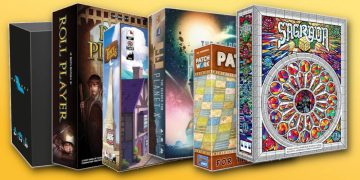Whether you're hosting a game night or throwing a casual get-together of friends or family, you might find yourself facing a tough question: How do you keep a large group of people entertained?
One option is to let them break up into smaller pockets of chit-chat and everyone can just move to and fro between groups, migrating from discussion to discussion. Sometimes that's the right call!
But what if you want everyone to have fun together? Video games aren't good for entire parties while TV shows and movies aren't good for getting people to interact with each other.
That's where party board games come into play. But not just any party board game! Because there are plenty that suck—do not waste your money on them. Here are the ones you should actually consider.
What Makes a Great Party Game?
My personal definition of a party board game is pretty broad, but I'm pretty picky when it comes to party board games that are worth my money. For me, a great party board game has these traits:
- It's easy to learn and quick to set up. Party activities demand low overhead. If a game takes more than a few minutes to set up, or more than 30 minutes to play, it's not a good candidate.
- It promotes direct interactions. Games that feel like "multiplayer solitaire" are the worst for parties.
- It has room for banter and small talk. Games that require full attention are too demanding for parties. Games that allow players to seamlessly leave and rejoin are optimal.
- It has little to no downtime. Players should never have to wait in silence while others finish up their turn—or, if it's necessary, then the wait should be negligibly short. A minute, max.
- It has broad appeal. Certain game mechanics are more universally acceptable than others (e.g. rolling dice, guessing, drawing, miming).
Of course, among the board games that meet these criteria, some are simply superior as far as how the gameplay comes together, what the overall experience is like, and how fun it is to play.
Here are the best party board games for larger groups that are accessible to all kinds of people—even those who don't play board games.
12. Saboteur: The Mother Lode
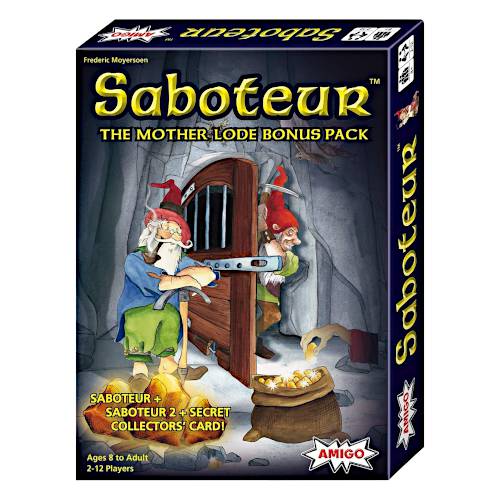
In Saboteur, players excavate a mine by placing path cards in a grid layout in hopes of reaching the ore. But some excavators are saboteurs and their goal is to prevent the good guys from reaching said ore.
The trick is, nobody knows who's good and who's not!
Saboteur is far from a perfect game, but it's cheap, it's straightforward, and it has exciting moments that'll have your group laughing and bantering as you suspect who might be the saboteur(s).
Note: Saboteur: The Mother Lode is a bundle pack that includes the original Saboteur plus the Saboteur 2 expansion. While the original Saboteur is just fine, Saboteur 2 makes it one of the best party games ever, so definitely get The Mother Lode!
11. One Night Ultimate Werewolf
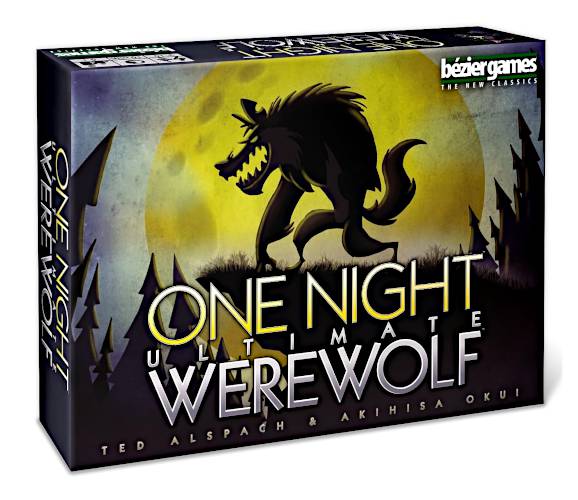
One Night Ultimate Werewolf throws away everything that sucks about the original Werewolf (you might know it as Mafia), then refines the good stuff into a party game that packs a huge punch.
This one has NO moderator, NO eliminations, and it plays in about 10 minutes—but those 10 minutes are hectic, frantic, and brimming with tension due to everyone having special abilities that add information or disrupt deductions people have made.
One Night Ultimate Werewolf plays fast and remains highly replayable. You can play it once or you can play it a hundred times! And that makes it a party game staple for any collection.
10. Bang! The Dice Game
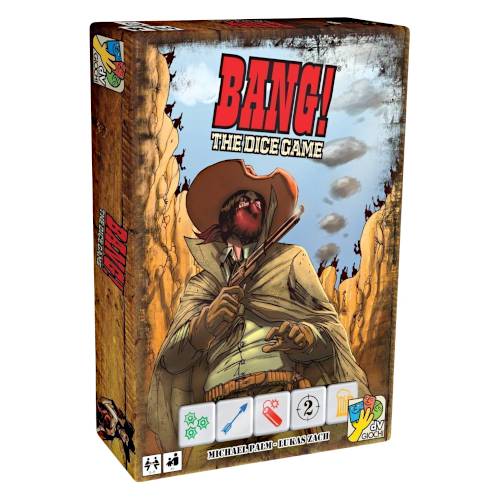
Bang! The Dice Game is a huge improvement on the original Bang!, not only for its streamlined gameplay and faster turns, but because its moments of tension are way more tense and engaging.
The general idea is the same: one player is Sheriff, some players are Deputies, some players are Outlaws, some players are Renegades, and you don't know anyone's roles.
Each role has its own win condition, so you'll be able to suss out identities based on their behaviors. However, player actions are restricted to their dice roll results, so behaviors aren't always perfectly straightforward!
If your group just wants to sit back and chill while emulating a Wild West shootout, this is the one. Bang! The Dice Game packs a surprisingly high amount of fun into just a handful of dice.
9. Wits & Wagers Party
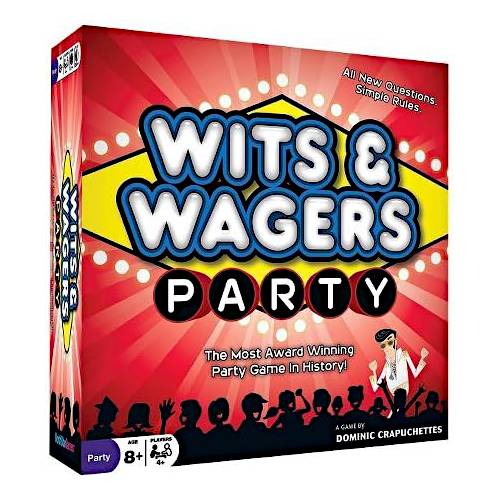
Wits & Wagers is the ultimate trivia board game for people who hate trivia board games, and Wits & Wagers Party is a simplified version that can accommodate up to a whopping 18 players.
Every round, one player reads out a question and everyone else writes down an answer. The guesses are turned face up on the table, then everyone bets on which answer they think is closest to correct.
What makes Wits & Wagers Party great is that you aren't penalized for lack of knowledge. Even if nobody knows the answer, it's okay—you just need to figure out which answer is least wrong.
Plus, it's hilarious when answers are flipped up and you see the astonishing range of guesses that were made! Everyone laughs together and no one is made the butt of a joke or made to feel stupid.
8. Concept
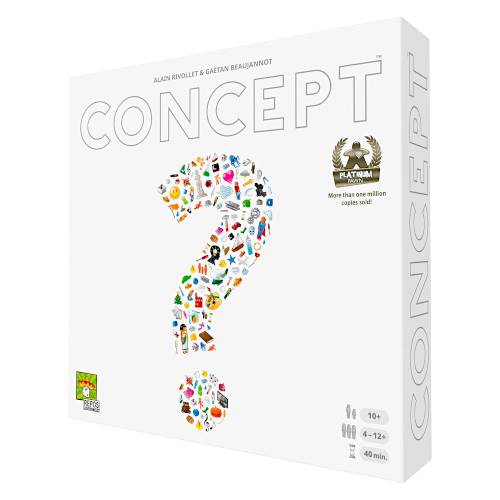
Designed by Gaëtan Beaujannot and Alain Rivollet
Supports 4 to 12 players
About 30 to 45 minutes
In Concept, the goal is to convey different concepts and ideas without talking—the only tool at your disposal is a central board full of different abstract icons and images.
On your turn, you're given a word or idea to depict, plus a handful of pegs and pips that you can place on the board. Depending on where you place them and how you place them, you can guide guessers toward the answer.
The concept cards come in varied difficulties, and it's fun to work your way up as a group to the really hard stuff!
Note: The official rules will break you up into teams, but I've found that the best way to play Concept is to ignore all that.
Concept is much better when played as individuals with a timer—1 minute for Easy concepts, 2 minutes for Medium, and 3 minutes for Hard—and everyone guessing the clue giver's hints.
If time runs out, no one earns any points. Otherwise, the correct guesser gets 2 points while the clue giver gets 1 point.
7. Cash 'n Guns (Second Edition)
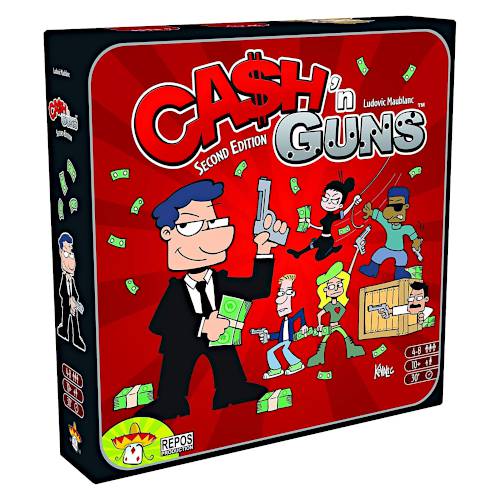
Cash 'n Guns is your chance to feel like you're really caught in a standoff, with guns pointed at you as you have your own gun in another's face.
Every round, several loot cards are revealed on the table. Then, players secretly load their guns with a bullet or a blank.
On the count of three, everyone aims their gun at another player—then, after some assessment, negotiation, and pleading, players may choose to chicken out and give up the round.
The remaining players reveal what's loaded in their guns, with bullets wounding targets and taking them out of the round. Surviving players take turns divvying up the loot.
6. Spyfall 2
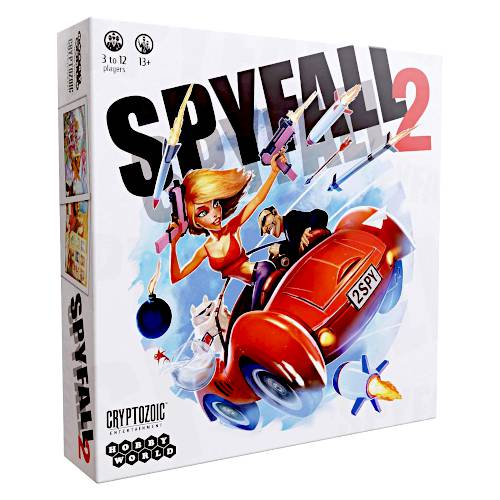
Spyfall 2 is the same game as Spyfall but with more content, allowing for up to 12 players and two spies rather than just one.
In this game, everyone is made privy to a particular location (e.g. Amusement Park, Coal Mine, Gaming Convention) except for the spies, who don't know what the location is.
Players take turns asking each other questions about the location (e.g. "What are you doing here?") to try to suss out who the spies are.
However, questions need to be vague because the spies will win if they can guess what the location is!
Spyfall 2 is the kind of game that draws out creativity in ways that end up being fun for everyone, and it's always fun when the spies get away with it and end up fooling everyone!
5. Camel Up (Second Edition)
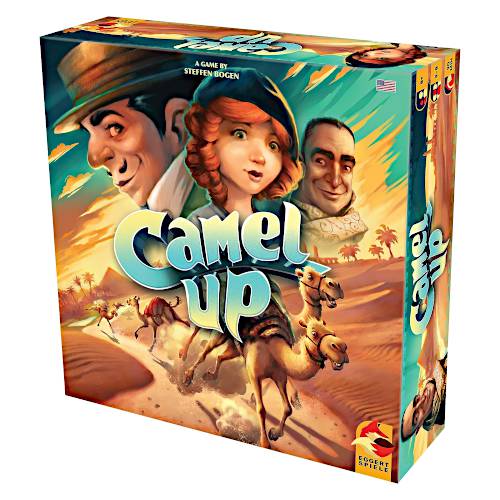
Camel Up is an ingenious game that replicates the experience of horse race betting in a way that's approachable, chaotic, unpredictable, and fun.
Five colored camels are racing around a track and you need to bet on the winner. The race is comprised of several legs, and you can also bet on which camel will be in the lead at the end of a given leg.
The twist? If a camel moves and ends up in the same spot as another camel, it stacks on top of that camel—and if a camel moves while other camels are stacked on it, all of them move with it.
There are other elements—like the white camel, black camel, and spectator tokens—that also influence how the camels move, making it a nail-biting experience right up to the very end!
4. Telestrations Party Pack
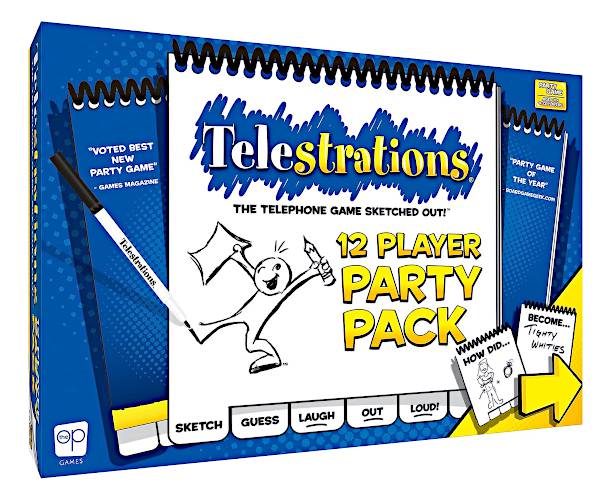
The original Telestrations remains one of the funniest party games I've ever played. To this day, I will always be down to play. Telestrations Party Pack is the same game but now supports up to 12 players.
Everyone starts with a notepad of blank pages. On the top page, everyone writes down an idea or concept to be guessed.
Notepads are passed to the left, and now everyone must use the next page to draw the idea or concept that just arrived in their hands.
Notepads are again passed to the left, but now everyone must convert the drawing they just received back into words.
Repeat all around the circle until everyone gets their initial notepad back. At that point, it's ROFL time as players present their notepads to the group, going through page after page of hilarious results.
3. Just One
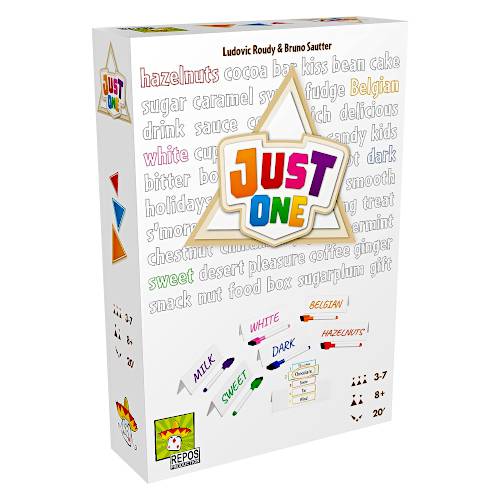
Designed by Ludovic Roudy and Bruno Sautter
Supports 3 to 8 players
About 20 to 30 minutes
Just One is a cooperative party game that combines elements from Scattergories and Taboo, resulting in a guessing game that's greater than the sum of its influences.
Each turn, one player is the guesser—they're the only one who can't see the mystery word. Everyone else writes down a one-word clue for the guesser, then all clues are revealed at the same time.
However, identical clues are cancelled out and hidden. The guesser opens their eyes and uses the remaining clues to guess the mystery word.
Played with 13 random cards from the set, the goal is to guess as many as you can as a group—but be careful! If a guess is ever wrong, one card is removed from the deck, reducing the total possible points.
Note: Just One technically only supports up to 7 players if played by the rules, but it can actually play with 8 players if the guesser always passes their easel to the previous guesser.
Furthermore, you can double the player count if you play as pairs (two players to a marker) or simply buy two sets.
2. Wavelength
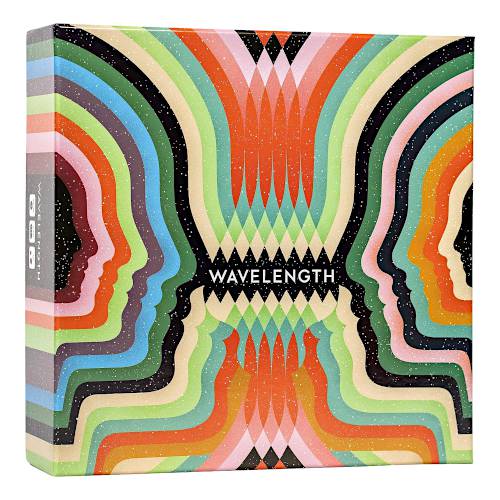
Designed by Alex Hague, Justin Vickers, and Wolfgang Warsch
Supports 2 to 12 players
About 30 to 45 minutes
Wavelength is a guessing party game that's played between two teams as they both try to read the mind of whoever is currently the Psychic.
The Psychic picks a clue card that represents a spectrum (e.g. Rough–Smooth, Sad–Happy, Unreliable–Reliable). Then, they're given a random bullseye position along that spectrum, and only they know where it is.
The goal is for the Psychic to give a clue that helps their team pinpoint the bullseye position. Once they guess, the other team guesses whether the Psychic's team was too short or too far along the spectrum.
Wavelength is great because it encourages creativity in the clue-giving, plus there's endless replayability—even if you pick the same clue card, the bullseye position is never the same twice.
My favorite aspect of Wavelength, however, is that you learn so much about the players in your group when it's their turn to be Psychic!
1. Monikers
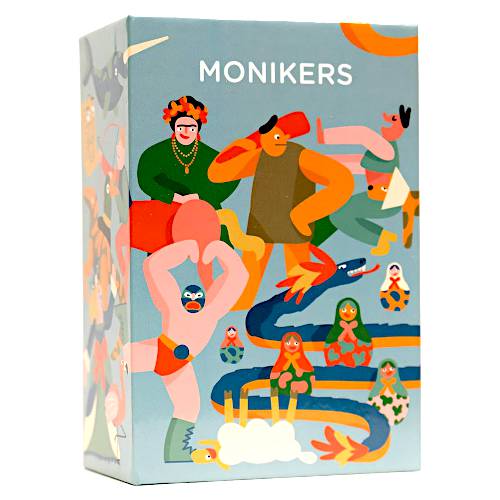
Designed by Alex Hague and Justin Vickers
Supports 4 to 16 players
About 30 to 60 minutes
Monikers is an amazing guessing party game that packs a thousand pounds of fun into just a few dozen cards. Each time you play, the chosen cards are different—of which there are hundreds in the box.
Played in teams, Monikers has one person giving clues to the cards while their team guesses for keeps. When time runs out (one minute), the remaining cards go to the other team for guessing. The cards go back and forth until they're all guessed.
But then comes round two! The same cards are shuffled and played again, except this time clues can only be a single word.
And then in round three, the same cards are shuffled and played again, except this time clues must be gestures only.
The thing is, the cards in Monikers are all people and characters. With each round, the clues grow increasingly nonsensical—but it works because the first round gets everyone acquainted with what's in play.
So even though you feel silly trying to gesture "The Kraken" in round three, your team expects it and doesn't judge you for weird arm waving.
Monikers is much more than Taboo or Charades. You aren't just playing a guessing game and you aren't just putting on a performance—you're forging inside jokes and social connections with each round, and that's what makes it the greatest party board game of all time.
